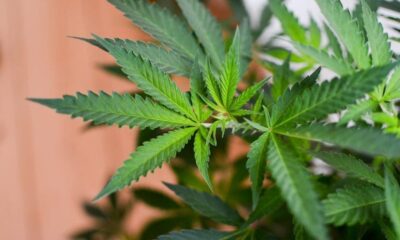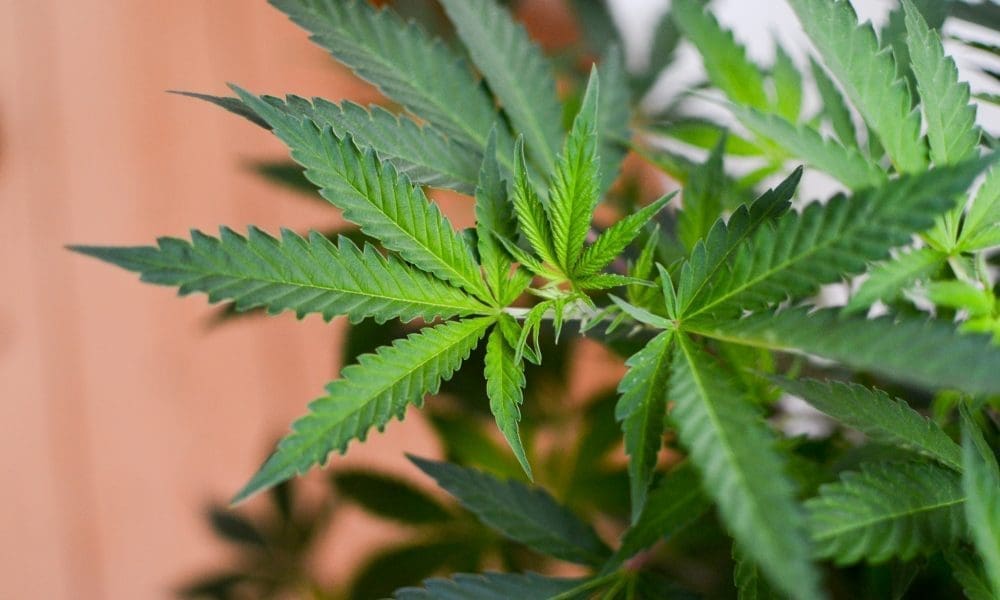featured
Missouri Cannabis Stakeholders Prepare 2026 Ballot Initiative To Create ‘Unified’ Marijuana And Hemp Regulations
Published
11 hours agoon

Missouri cannabis activists and industry stakeholders are gearing up for a push to put an initiative on the state’s 2026 ballot that’s meant to consolidate regulations and create parity between the hemp and marijuana sectors.
The marijuana legalization law that voters approved in 2022 enshrined regulations in the state Constitution, removing lawmakers’ ability to make certain adjustments. The industry coalition behind the forthcoming initiative is aiming to strike much of that language and instead give a constitutional mandate for the legislature to develop statutory rules themselves.
“In our American tradition, the purpose of a constitution is to define and restrain the power of governments—not the private sector or the individual,” Eapen Thampy, a lobbyist for American Shaman, told Marijuana Moment on Monday. “It’s the job of statutory law to handle regulation of the private sector.”
“I think this solves a lot of issues for a lot of people,” he said. “The marijuana guys have this insane regulatory burden created by regulations that they can’t change, despite the millions of dollars they spent supporting campaigns for office in the last election cycle.”
The text of the proposal is currently being drafted by an unnamed law firm, Thampy said during a virtual briefing with stakeholders and advocates on Monday. The plan is to get the measure filed by August to make the November 2026 ballot.
The effort is being organized under a new political committee called Missourians for a Single Market, which was formed this monrh.
In theory, the initiative would create a more leveled playing field for the marijuana and hemp industries, which currently abide by a discordant set of regulations. What stakeholders want to see is both industries treated more equitably, with policies that more closely resemble how the state deals with the alcohol and tobacco markets.
“We’ve got this artificial legal construct called ‘marijuana’ and this artificial legal construct called ‘hemp,’ and these two legal creations represent one plant,” Thampy said. “And so the idea here is, it’s one plant. There should be one unified market. There should be one unified set of regulations.”
“We have an opportunity in Missouri to pioneer a first-in-the-nation approach,” he said.
Steve DeAngelo, a well-known marijuana advocate and entrepreneur who has been involved in multiple successful legalization campaigns in the past and founded the Harborside dispensary in Oakland, California, also joined Monday’s video conference and voiced his support for the proposal.
He described the three “pillars” of the industry that he feels should be unified under a single regulatory model: marijuana, hemp and “legacy” operators that were in the space before legalization.
“When you bring down the barriers to entry, all of the legacy folks who are right now out of the legal system would be able to come in,” he said. “So you create one single, unified market for cannabis across all sectors. That’s the proposal that I have to advance now.”
—
Marijuana Moment is tracking hundreds of cannabis, psychedelics and drug policy bills in state legislatures and Congress this year. Patreon supporters pledging at least $25/month get access to our interactive maps, charts and hearing calendar so they don’t miss any developments.![]()
Learn more about our marijuana bill tracker and become a supporter on Patreon to get access.
—
Meanwhile, Missouri’s hemp market has been facing increased pressure from the state as officials attempt to crack down on businesses selling intoxicating cannabis products such as THCA outside of the marijuana program. Missouri Attorney General Andrew Bailey (R) sent over a dozen cease-and-desist orders to such businesses this month, threatening potential legal action for non-compliant businesses.
Lawmakers are contemplating multiple approaches, with different details on what kinds of products would be allowed and what limits would be set on THC levels in the products.
In February, legislation allowing low-dose intoxicating hemp beverages to continue to be sold in grocery and liquor stores was reported favorably by committees in both the House and Senate but was not enacted into law.
D.C. Hemp Company Sues Feds Over ‘Unworkable Standard’ Created By Marijuana Budget Rider
Photo courtesy of Philip Steffan.

Author: mscannabiz.com
MScannaBIZ for all you Mississippi Cannabis News and Information.
You may like
-


GOP Senators File Bill To Ramp Up Criminalization Of ‘Candy-Flavored’ Marijuana Edibles
-


Wisconsin Will Legalize Marijuana If Democrats Control Legislature, Governor Says, So People Can Stop Buying It Next Door In Illinois
-


D.C. Hemp Company Sues Feds Over ‘Unworkable Standard’ Created By Marijuana Budget Rider
-


Could Watertown reverse course on cannabis shops?
-


Colorado Healing Center Facilitates First Psilocybin Session Under Voter-Approved Psychedelics Legalization Law
-


5 Ways Microdosing Cannabis Can Boost Work Performance
featured
GOP Senators File Bill To Ramp Up Criminalization Of ‘Candy-Flavored’ Marijuana Edibles
Published
5 hours agoon
June 16, 2025
A coalition of Republican senators have reintroduced a bill that would increase criminal penalties for a wide range of offenses, including manufacturing or selling Schedule I drugs like marijuana in the form of candy or beverages if there is “reasonable cause to believe” they will be sold to minors.
Led by Senate Judiciary Committee Chairman Chuck Grassley (R-IA), alongside 10 other GOP members, the Combating Violent and Dangerous Crime Act contains provisions targeting substances that are in Schedule I or II of the federal Controlled Substances Act (CSA), including cannabis.
While certain legal marijuana states have proactively taken steps to prohibit cannabis marketing that might appeal to children, many state markets continue to allow THC-infused beverages and sell edible gummies and cookies, for example.
The Senate legislation itself doesn’t explicitly mention marijuana, but a section-by-section analysis says that “manufacturers and traffickers of marijuana edibles and fentanyl and other illicit drugs are marketing and distributing these highly dangerous drugs as packaged candy (Nerds, Skittles, etc.).”
“For years, there have been reports of children, even younger than 6 years old, overdosing on these drugs due to edible consumption,” it says. “This provision is the language of the 2017 Grassley-Feinstein Protecting Kids from Candy-Flavored Drugs Act, which has not been reintroduced as a bipartisan measure this Congress. The language amends the Controlled Substances Act to provide enhanced penalties for marketing candy-flavored controlled substances to minors.”
The language in the current legislation also mirrors a version of the bill that Grassley and other Republican lawmakers filed in 2022.
In a press release, Grassley blamed the Biden administration for what he described as a “massive spike in violent crime,” and he said it’s now the responsibility of Congress “to resolve any legal ambiguities that may weaken our ability to hold criminals fully accountable.”
With respect to the flavored drugs provisions, it should be noted that every state that has legalized marijuana for adult use in the U.S. has set an age limit that prevents people under 21 from legally accessing cannabis shops. Those dispensaries, and the brands they sell, therefore generally would not seem to meet the criteria for knowingly selling to underage people. (Studies have found consistent compliance at marijuana shops when it comes to enforcing ID requirements.)
If Grassley’s legislation is enacted, one possible effect would be that people who are federally prosecuted for such criminal activity could face up to 10 additional years in prison for a first offense if the cannabis product sold to a person under 18 was shaped or flavored like candy. Second and subsequent offenses would carry up to 20 additional years in prison.
Legalization advocates largely support measures to restrict access to underage people, but some bristle at the possibility of enacting significantly increased penalties that could be applied by overzealous prosecutors as part of the war on drugs.
“Soft-on-crime policies have failed to ensure our justice system and law enforcement at all levels have the necessary authorities and tools to maintain order and protect communities from dangerous criminals,” Sen. John Boozman (R-AR), the co-lead on the measure, said. “I am proud to join Senator Grassley and my colleagues to ensure violent offenders are held accountable under the law.”
Unlike Grassley’s press release, Boozman’s specifically states that provisions of the bill would “outlaw the marketing of candy-flavored drugs including marijuana and fentanyl to minors.”
Other cosponsors are Sens. Mike Crapo (R-ID), Kevin Cramer (R-ND), Bill Cassidy (R-LA), James Lankford (R-OK), Mitch McConnell (R-KY), Susan Collins (R-ME), Shelley Moore Capito (R-WV), Thom Tillis (R-NC) and Jim Risch (R-ID).
“Our legal system has a duty to punish the guilty and protect the innocent, and conflicting legal standards hamper the ability of federal authorities to do so,” Crapo said in a press release circulated by his office. “These necessary reforms clarify and strengthen federal drug and violent crime laws to ensure justice is applied fairly to all.”
Photo courtesy of Pexels/Kindel Media.

Author: mscannabiz.com
MScannaBIZ for all you Mississippi Cannabis News and Information.
featured
Wisconsin Will Legalize Marijuana If Democrats Control Legislature, Governor Says, So People Can Stop Buying It Next Door In Illinois
Published
6 hours agoon
June 16, 2025
The governor of Wisconsin says that, if Democrats take control of the legislature now that new “fair” district maps have been set, the state can “finally” legalize marijuana so that residents don’t have to go to neighboring Illinois to patronize its adult-use market.
During a speech at the Democratic Party of Wisconsin’s 2025 convention on Sunday, Gov. Tony Evers (D) said “Republicans better start getting used to Democrats being in power in the state,” as the new redistricting map he approved last year could deliver the party a “Democratic trifecta,” with control of the Assembly, Senate and governor’s office.
That would free up lawmakers to overcome roadblocks in the currently conservative legislature that have prevented the advancement of several key issues, including health care expansion, parental leave and, “yes, we could finally legalize marijuana so we can stop sending our revenue down to my good friend, [Gov. J.B. Pritzker (D)] down in Illinois,” he said.
“He’s got enough,” Evers joked.

“If we want to finally end the obstruction of Madison, we have to get to work—and we can’t wait. We have to start today,” he said. “If we want majorities that will finally get things done in the legislature, then our work starts right now.”
“We knock on doors, we make the calls, we organize from our kitchen tables to our communities—we fight back and we never stop fighting for what’s right,” the governor said. “Winning 2026 starts now. Let’s go fight to win every vote for every seat and in every election, and let’s get to work.”
Senate Minority Leader Dianne Hesselbein (D) also briefly touched on the issue at the convention, saying “we will also legalize cannabis” among other priorities in the Democratic agenda if the party wins a legislative majority in next year’s elections.

The governor and top Democratic senator’s comments come about a month after Republicans cut key provisions from a state budget proposal from Evers, including plans to legalize and regulate marijuana.
The actions are a repeat of two years ago, when GOP members of the same committee removed proposals to legalize cannabis for recreational and medical use from the governor’s biennial executive budget at that time.
Evers included the latest marijuana legalization plan in his biennial budget request to lawmakers in February, projecting at the time that the change would result in “$58.1 million in revenue in fiscal year 2026-27 and growing amounts in future years.”
Under current Wisconsin law, cannabis is illegal for both recreational and medical purposes.
The legalization proposal would have imposed a 15 percent wholesale excise tax and a 10 percent retail excise tax on recreational cannabis products. It would additionally “create a process for individuals serving sentences or previously convicted of marijuana-related crimes to have an opportunity to repeal or reduce their sentences for nonviolent minor offenses.”
The companion bills that were filed in tandem with the governor’s budget request stipulate that all revenue collected from the proposed cannabis taxes will be deposited into the state general fund.
—
Marijuana Moment is tracking hundreds of cannabis, psychedelics and drug policy bills in state legislatures and Congress this year. Patreon supporters pledging at least $25/month get access to our interactive maps, charts and hearing calendar so they don’t miss any developments.![]()
Learn more about our marijuana bill tracker and become a supporter on Patreon to get access.
—
Despite Republicans’ move to cut legalization from the budget legislation, party leaders recently acknowledged that the debate over medical marijuana legalization is “not going to go away,” and there’s hope it can be resolved this session.
“I don’t think anyone is naive enough to think that marijuana and THC products aren’t present in the state of Wisconsin when they are readily available over state lines, so I think we need to come to an answer on this,” Assembly Majority Leader Rep. Tyler August (R) said in February. “I’m hopeful that we can.”
“If we’re going to call it medical marijuana, it needs to be treated like a pharmaceutical. But the marijuana debate is going to be something that is not going to go away,” Sen. Dan Feyen (R), the assistant majority leader, said at the time. “The margins are tighter.”
There have been repeated attempts to legalize medical marijuana in the legislature over recent years, including the introduction of legislation from Assembly Speaker Robin Vos (R) that called for a limited program facilitated through state-run dispensaries. That proved controversial among his Republican colleagues, however, and it ultimately stalled out last year.
Evers previewed his plan to include marijuana legalization in his budget in January, while also arguing that residents of the state should be allowed to propose new laws by putting binding questions on the ballot—citing the fact that issues such as cannabis reform enjoy sizable bipartisan support while the GOP-controlled legislature has repeatedly refused to act.
Previously, in 2022, the governor signed an executive order to convene a special legislative session with the specific goal of giving people the right to put citizen initiatives on the ballot, raising hopes among advocates that cannabis legalization could eventually be decided by voters. The GOP legislature did not adopt the proposal, however.
Evers said in December that marijuana reform is one of several key priorities the state should pursue in the 2025 session, as lawmakers work with a budget surplus.
Days after he made the remarks, a survey found the reform would be welcomed by voters in rural parts of the state. Nearly two thirds (65 percent) said they support legalizing cannabis.
Last May, the governor said he was “hopeful” that the November 2024 election would lead to Democratic control of the legislature, in part because he argued it would position the state to finally legalize cannabis.
“We’ve been working hard over the last five years, several budgets, to make that happen,” he said at the time. “I know we’re surrounded by states with recreational marijuana, and we’re going to continue to do it.”
A Wisconsin Democratic Assemblymember tried to force a vote on a medical cannabis compromise proposal last year, as an amendment to an unrelated kratom bill, but he told Marijuana Moment he suspects leadership intentionally pulled that legislation from the agenda at the last minute to avoid a showdown on the issue.
Meanwhile, the state Department of Revenue released a fiscal estimate of the economic impact of a legalization bill from then-Sen. Melissa Agard (D) in 2023, projecting that the reform would generate nearly $170 million annually in tax revenue.
A legislative analysis requested by lawmakers estimated that Wisconsin residents spent more than $121 million on cannabis in Illinois alone in 2022, contributing $36 million in tax revenue to the neighboring state.
Evers and other Democrats have since at least last January insisted that they would be willing to enact a modest medical marijuana program, even if they’d prefer more comprehensive reform.
Photo courtesy of Philip Steffan.

Author: mscannabiz.com
MScannaBIZ for all you Mississippi Cannabis News and Information.
featured
D.C. Hemp Company Sues Feds Over ‘Unworkable Standard’ Created By Marijuana Budget Rider
Published
7 hours agoon
June 16, 2025
A hemp retailer in Washington, D.C. is suing the the federal government over a budget restriction that prevents local officials from establishing and regulating a retail marijuana market.
Capitol Hemp filed the suit in U.S. District Court for the District of Columbia on Thursday, seeking a declaration from a federal judge that the congressional budget rider doesn’t stand in the way of D.C. adopting legislation to regulate hemp.
“Although hemp was removed from the federal Controlled Substances Act in 2018, the District of Columbia has continued to take enforcement actions against hemp without adopting any legislation specifically addressing it. As a direct result of such enforcement,” the company’s complaint says, Capitol Hemp “has been named as a defendant in a related federal case.”
At the center of the lawsuit is the so-called Harris rider, a longtime ban blocking Washington, D.C. from creating a system of regulated adult-use marijuana sales. It’s named after Rep. Andy Harris (R-MD), who was behind the initial ban in 2014. It was renewed last year after earlier efforts to remove the longtime provision.
Capitol Hemp is asking the court to declare the language of the Harris amendment “unconstitutionally vague” because it employs the term “tetrahydrocannabinols derivative,” which the company asserts is “lacking any established statutory definition or limiting principle.”
It further says the federal restriction’s reference to “any Schedule I substance…or any tetrahydrocannabinols derivative” is “ambiguous and unworkable” when read in conjunction with D.C.’s Controlled Substances Act.
The situation, the complaint says, “creates an ambiguous and unworkable standard that prevents the District from determining which substances it may lawfully regulate.”
Specifically, Capitol Hemp’s challenge says, if the federal restriction is interpreted to include all THC, it “could be construed to bar the District from regulating or even clarifying the status of lawful hemp-derived cannabinoids such as delta-8 THC.”
The suit, reported earlier by Politico, comes as both federal and state lawmakers increasingly move to crack down on markets for intoxicating hemp products, which can sometimes contain as much psychoactive THC as state-regulated marijuana products. The situation—which many have called a loophole resulting from the 2018 Farm Bill’s legalization of hemp nationwide—has raised broad public health concerns, in large part because the products are often untested and easily available to minors.
At the state level, multiple states—from California to Florida—have moved to ban intoxicating cannabinoids in recent months. In Texas, the legislature recently delivered a bill to the governor that would outlaw all consumable hemp-derived cannabinoid products containing any detectable THC.
And in Congress, a powerful GOP-led House committee recently amended a report for a spending bill containing provisions that hemp stakeholders say would upend the industry. The report clarifies that the panel does not intend to prohibit non-intoxicating cannabinoid products with “trace or insignificant amounts of THC” that were federally legalized during the first Trump administration.
Harris, meanwhile—namesake of the Harris rider at issue in the current suit—complained at the hearing that the Farm Bill “has resulted in the proliferation of intoxicating cannabinoid products, including delta-8 and hemp flower, being sold online and in gas stations nationwide under the false guise of being ‘USDA approved.’”
“As many states have stepped in to curb these dangerous project products from reaching consumers, particularly children, it’s time for Congress to act to close this loophole while protecting industrial hemp industry,” Harris said. “Reports that the included language would destroy legitimate businesses are simply not true, and that’s clear to anyone closely reading the carefully drafted language that I believe threaded the needle.”
Language in the bill itself would still effectively eliminate the most commonly marketed hemp products within the industry, as even non-intoxicating CBD items that are sold across the country typically contain trace amounts of THC. Under current law, those products are allowed if they contain no more than 0.3 percent THC by dry weight.
Jonathan Miller, general counsel at the U.S. Hemp Roundtable, told Marijuana Moment that the new report language doesn’t fully address the industry’s concerns, pointing out that it “has no binding impact on the law, and this is especially important because, over the last several years, [the Food and Drug Administration, or FDA] has continually ignored the report language when it comes to hemp and CBD.”
The hemp language is largely consistent with appropriations and agriculture legislation that was introduced, but not ultimately enacted, under the last Congress.
Hemp industry stakeholders rallied against that proposal, an earlier version of which was also included in the base bill from the subcommittee last year. It’s virtually identical to a provision of the 2024 Farm Bill that was attached by a separate committee last May via an amendment from Rep. Mary Miller (R-IL), which was also not enacted into law.
There are some differences between the prior spending bill and this latest version for 2026, including a redefining of what constitutes a “quantifiable” amount of THC that’d be prohibited for hemp products.
It now says that a quantifiable amount is “based on substance, form, manufacture, or article (as determined by the Secretary of Health and Human Services in consultation with the Secretary of Agriculture),” whereas it was previously defined as an amount simply “determined by the Secretary in consultation with the Secretary of Health and Human Services.”
The proposed legislation also now specifies that the term hemp does not include “a drug that is the subject of an application approved under subsection (c) or (j) of section 505 of the Federal Food, Drug, and Cosmetic Act (21 U.S.C. 355),” which seems to carve out an exception for Food and Drug Administration- (FDA) approved drugs such Epidiolex, which is synthesized from CBD.
A leading alcohol industry association, meanwhile, has called on Congress to dial back language in the House spending bill that would ban most consumable hemp products, instead proposing to maintain the legalization of naturally derived cannabinoids from the crop and only prohibit synthetic items.
Wine & Spirits Wholesalers of America (WSWA) President and CEO Francis Creighton said in a press release on Thursday that “proponents and opponents alike have agreed that this language amounts to a ban.”
“By pushing a rapidly evolving industry back into the shadows, Congress is creating even more chaos in the marketplace, undermining state initiatives and punishing responsible actors,” he said. “We urge the full House to reconsider this approach. States can regulate intoxicating products safely and effectively through systems that preserve consumer trust and public safety. It’s time for Congress to follow their lead, not override their authority.”
Members of Wine & Spirits Wholesalers of America (WSWA) also met with lawmakers and staffers in April to advocate for three key policy priorities that the group says is based on “sound principles of alcohol distribution.” They include banning synthetic THC, setting up a federal system for testing and labeling products and establishing state-level power to regulate retail sales.
Separately, key GOP congressional lawmakers—including one member who supports marijuana legalization—don’t seem especially concerned about provisions in a new spending bill that would put much of the hemp industry in jeopardy by banning most consumable products derived from the plant.
Miller at the U.S. Hemp Roundtable, told congressional lawmakers in April that the market is “begging” for federal regulations around cannabis products.
At the hearing, Rep. James Comer (R-KY) also inquired about FDA inaction around regulations, sarcastically asking if it’d require “a gazillion bureaucrats that work from home” to regulate cannabinoids such as CBD.
A report from Bloomberg Intelligence (BI) last year called cannabis a “significant threat” to the alcohol industry, citing survey data that suggests more people are using cannabis as a substitute for alcoholic beverages such a beer and wine.
Last November, meanwhile, a beer industry trade group put out a statement of guiding principles to address what it called “the proliferation of largely unregulated intoxicating hemp and cannabis products,” warning of risks to consumers and communities resulting from THC consumption.
Read the full complaint below:
Attorneys General Group Hosts Meeting On State-Level Regulation Of Intoxicating Hemp Products

Author: mscannabiz.com
MScannaBIZ for all you Mississippi Cannabis News and Information.

GOP Senators File Bill To Ramp Up Criminalization Of ‘Candy-Flavored’ Marijuana Edibles

Wisconsin Will Legalize Marijuana If Democrats Control Legislature, Governor Says, So People Can Stop Buying It Next Door In Illinois

D.C. Hemp Company Sues Feds Over ‘Unworkable Standard’ Created By Marijuana Budget Rider

Could Watertown reverse course on cannabis shops?

Colorado Healing Center Facilitates First Psilocybin Session Under Voter-Approved Psychedelics Legalization Law

5 Ways Microdosing Cannabis Can Boost Work Performance

Shop LGBTQIA+ brands and dispensaries this Pride Month

Curaleaf Appoints New President, Bolsters Marketing Leadership Team

Missouri Cannabis Stakeholders Prepare 2026 Ballot Initiative To Create ‘Unified’ Marijuana And Hemp Regulations

California Public Health Department Aims to Make Hemp THC Ban Permanent

Texas Gov. Signs Bill Containing $100M for Psychedelic Research

Snoop Dogg Expands His Cannabis Brand Again, With New THCA Hemp Product Sales Website

The Best Jokes For Your Monday

Sunset Social Club Opens Hollywood’s 1st Luxury Cannabis Lounge

California Moves to Permanently Ban Hemp THC Products

Companies Challenging Federal Marijuana Prohibition Seek Supreme Court Review, But Will Justices Take The Case?

Bill on Trump’s desk could ease cannabis research, congressman says (Newsletter: June 16, 2025)

Alabama Judge Will Hear Lawsuit From Parents Over State’s Medical Marijuana Delays

State, federal cannabis changes threaten Ohio festival’s future

US Senator, Congresswoman Call on Trump to End ‘Costly Marijuana Arrests’

Ohio Lawmakers Must Close Hemp Loophole And Limit Intoxicating Products To Marijuana Dispensaries (Op-Ed)

Teacher sued for allegedly giving Denver middle school students marijuana brownies

Teacher accused of giving Denver middle school students cannabis brownies

Perry Police arrest woman for allowing her child to eat cannabis brownie

Alert: Department of Cannabis Control updates data dashboards with full data for 2023

5 best CBD creams of 2024 by Leafly

Connecticut Appoints The US’s First Cannabis Ombudsperson – Yes there is a pun in there and I’m Sure Erin Kirk Is Going To Hear It More Than Once!

Free delta-9 gummies from Bay Smokes

EU initiative begins bid to open access to psychedelic therapies
New Study Analyzes the Effects of THCV, CBD on Weight Loss

Mississippi city official pleads guilty to selling fake CBD products

May 2024 Leafly HighLight: Pink Runtz strain

Curaleaf Start Process Of Getting Their Claws Into The UK’s National Health System – With Former MP (Resigned Today 30/5/24) As The Front Man

Horn Lake denies cannabis dispensary request to allow sale of drug paraphernalia and Sunday sales | News

5 best autoflower seed banks of 2024 by Leafly

Discover New York’s dankest cannabis brands [September 2024]

Press Release: CANNRA Calls for Farm Bill to Clarify Existing State Authority to Regulate Hemp Products

Local medical cannabis dispensary reacts to MSDH pulling Rapid Analytics License – WLBT

Nevada CCB to Accept Applications for Cannabis Establishments in White Pine County – “Only one cultivation and one production license will be awarded in White Pine County”

The Daily Hit: October 2, 2024

6 best CBD gummies of 2024 by Leafly

5 best THC drinks of 2024 by Leafly

5 best delta-9 THC gummies of 2024 by Leafly

Weekly Update: Monday, May 13, 2024 including, New Guide for Renewals & May Board meeting application deadline

People In This State Googled ‘Medical Marijuana’ The Most, Study Shows

PRESS RELEASE : Justice Department Submits Proposed Regulation to Reschedule Marijuana

Press Release: May 9, STIIIZY and Healing Urban Barrios hosted an Expungement Clinic & Second Chance Resource Fair

Thailand: Pro-cannabis advocates rally ahead of the government’s plan to recriminalize the plant
Trending
-

 California Cannabis Updates1 year ago
California Cannabis Updates1 year agoAlert: Department of Cannabis Control updates data dashboards with full data for 2023
-

 Breaking News1 year ago
Breaking News1 year agoConnecticut Appoints The US’s First Cannabis Ombudsperson – Yes there is a pun in there and I’m Sure Erin Kirk Is Going To Hear It More Than Once!
-

 best list11 months ago
best list11 months ago5 best CBD creams of 2024 by Leafly
-

 Bay Smokes12 months ago
Bay Smokes12 months agoFree delta-9 gummies from Bay Smokes
-

 Business9 months ago
Business9 months agoEU initiative begins bid to open access to psychedelic therapies
-

 cbd1 year ago
cbd1 year agoNew Study Analyzes the Effects of THCV, CBD on Weight Loss
-

 Mississippi Cannabis News1 year ago
Mississippi Cannabis News1 year agoMississippi city official pleads guilty to selling fake CBD products
-

 California1 year ago
California1 year agoMay 2024 Leafly HighLight: Pink Runtz strain

